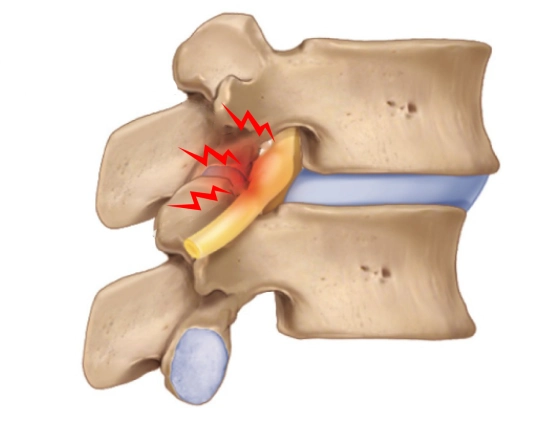Spine Surgeon
Spondylolisthesis Treatment in Mumbai , India
Spondylolisthesis
Spondylolisthesis, a spinal disorder, often manifests as lower back discomfort, stemming from the displacement of one vertebra over the adjacent one. Typically, this condition responds well to non-surgical interventions for symptom management. However, in instances of severe spondylolisthesis, surgery has proven effective in alleviating symptoms for the majority of patients.
What are the causes and symptoms of Spondylolisthesis?
Causes:
- Congenital Abnormalities: Anomalies present from birth, such as defects in the vertebrae or spinal joints, can predispose individuals to spondylolisthesis.
- Degenerative Changes: Degenerative conditions of the spine, including disc degeneration, arthritis, and facet joint deterioration, can contribute to spondylolisthesis development.
- Traumatic Injuries: Acute injuries, such as fractures or trauma to the spine, can result in vertebral displacement and spondylolisthesis.
- Repetitive Stress: Activities or occupations that involve repetitive stress on the spine, such as heavy lifting or certain sports, may increase the risk of spondylolisthesis.
Symptoms:
- Lower Back Pain: Spondylolisthesis commonly presents with persistent lower back pain, which may worsen with movement or activity.
- Radicular Pain: Nerve compression associated with spondylolisthesis can cause radiating pain, numbness, or tingling sensations that extend into the buttocks, thighs, or legs.
- Muscle Stiffness: Patients may experience muscle stiffness or tightness in the lower back, limiting range of motion and flexibility.
- Weakness: Spondylolisthesis-related nerve compression can lead to muscle weakness, particularly in the legs, affecting mobility and strength.
- Changes in Gait: Individuals with severe spondylolisthesis may exhibit changes in gait or posture due to pain, weakness, or instability in the spine.
- Bowel or Bladder Dysfunction: In rare cases of severe nerve compression, spondylolisthesis may cause bowel or bladder dysfunction, requiring urgent medical attention.
How to diagnose spondylolisthesis?
- X-rays: X-ray imaging of the spine will be performed to visualize the vertebrae and assess for vertebral displacement or other abnormalities.
- MRI (Magnetic Resonance Imaging): MRI scans provide detailed images of the soft tissues in the spine, helping to identify nerve compression and spinal abnormalities.
- CT (Computed Tomography) Scan: CT scans may be used to provide additional detailed images of the spine, particularly to assess bony abnormalities or fractures.
- Additional Tests: In some cases, additional tests such as bone scans or electromyography (EMG) may be ordered to evaluate bone health or nerve function.
- Specialized Studies: Dynamic X-rays or flexion-extension X-rays may be performed to assess spinal stability and movement, particularly in complex cases or when surgical intervention is being considered.
What are the treatment options for Spondylolisthesis?
- Physical Therapy: Exercises to strengthen the muscles supporting the spine and improve flexibility.
- Medications: Nonsteroidal anti-inflammatory drugs (NSAIDs), muscle relaxants, or pain relievers to alleviate symptoms.
- Activity Modification: Avoiding activities that exacerbate symptoms, such as heavy lifting or high-impact sports.
- Epidural Steroid Injections: Injections of corticosteroids into the affected area to reduce inflammation and alleviate pain.
- Bracing: A back brace may be recommended to provide support and stability to the spine, particularly in cases of adolescent spondylolisthesis.
What is the surgical intervention for Spondylolisthesis?
- Spinal Fusion
- Laminectomy
- Foraminotomy
- Posterolateral Fusion
- Transforaminal Lumbar Interbody Fusion (TLIF)
- Anterior Lumbar Interbody Fusion (ALIF)
- Posterior Lumbar Interbody Fusion (PLIF)
- Decompression Surgery
- Pedicle Screw Fixation
- Artificial Disc Replacement
Book your appointment with Spondylolisthesis Treatment in Mumbai , India top spine doctors at Synapse Spine for expert evaluation and personalized treatment plans. Benefit from the renowned expertise of our specialists in addressing various spine conditions. Take the first step towards optimal spinal health by scheduling your consultation with Synapse Spine today.

